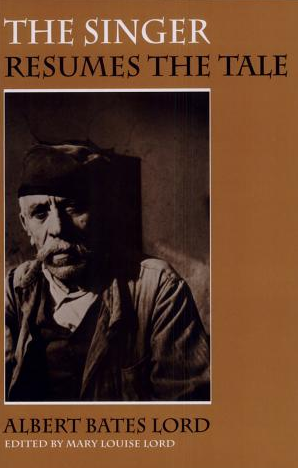Now available in open-access, full-text edition in the curated books section of the CHS website: The Singer Resumes the Tale, by Albert Bates Lord

Long before writing was invented, people told stories and sang songs. But how is an oral poem composed? How is it transmitted beyond its circle of listeners to future generations? One of the preeminent folklorists of his time, Albert Bates Lord (1912-1991) here continues the project, begun in the classic work The Singer of Tales, of describing this traditional process.
Edited by Mary Louise Lord after the author’s death, The Singer Resumes the Tale focuses on the performance of stories and poems within settings that range from ancient Greek palaces to Latvian villages. Lord expounds and develops his approach to oral literature in this book, responds systematically for the first time to criticisms of oral theory, and extends his methods to the analysis of lyric poems. He also considers the implications of the transitional text—a work made up of both oral and literary components.
Elements of the oral tradition—the practice of storytelling in prose or verse, the art of composing and transmitting songs, the content of these texts, the kinds of songs composed, and the poetics of oral literature—are discussed in the light of several traditions, beginning in the ancient world, through the Middle Ages, to the present. Throughout, the central figure is always the singer. Homer, the Beowulf poet, women who perform lyric songs, tellers of folktales, singers of such ballads as “Barbara Allen,” bards of the Balkans: all play prominent roles in Lord’s book, as they have played central roles in the creation of this fundamental literature.
The late Albert Bates Lord was Arthur Kingsley Porter Professor of Slavic and Comparative Literature, Emeritus, at Harvard University.
Mary Louise Lord is Professor of Classics, Emerita, at Connecticut College.
-
Fellowships
- Fellowships in Hellenic Studies
- Early Career Fellowships
- Summer Fellowships
- CHS-IHR Joint Fellowship
- Current Fellows in Hellenic Studies
- Previous Fellows Previous Fellows – Chronological Lists
